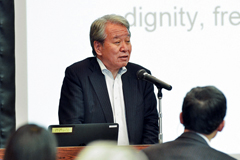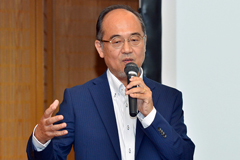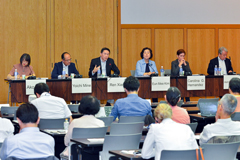How Is Human Security Practiced by ASEAN+3? Event Held for Publication of a Research Compilation
2018.11.14
On September 28, 2018, the JICA Research Institute (JICA-RI) hosted the symposium “The Practices of Human Security in the ASEAN+3: Recommendations from Academics and Practitioners.”
The JICA-RI research project “Human Security in Practice: East Asian Experiences” was a collaboration between 36 researchers and practitioners starting in 2013 to identify how the concept of human security was understood and practiced in the following countries: Indonesia, Cambodia, Malaysia, Myanmar, the Philippines, Singapore, Thailand, Vietnam, Japan, China and South Korea. The symposium was held to commemorate the publication of the book “Human Security and Cross-Border Cooperation in East Asia,” a compilation of findings specifically related to the practice of human security in the region.
In her opening remarks, Nobuko Kayashima, JICA-RI director at the time (now principal research fellow), related the sequence of events leading to the launch of the research, and said, “In recent years, there have been many serious military conflicts and natural disasters that threaten human life and dignity, and it is necessary for the international community to respond in solidarity. Accordingly, JICA-RI has designated human security as one of its main themes since its founding.”
Next, JICA-RI Distinguished Fellow Akihiko Tanaka, president of the National Graduate Institute for Policy Studies (GRIPS), gave a keynote lecture on the relationship between the theory and practice related to human security. Tanaka pointed out that the concept of human security was introduced because of the recognition that the focus of security should include individual people in addition to the traditional “state.” He argued that the concept of “human security” is complementary to the concept of “human development” which is often defined as the process of enlarging people’s choices as human security directs our attention to downside risks that can hinder the process of human development. Tanaka then presented his theoretical framework of classifying threats to human security, which is used in the empirical chapters of the book. According to this theoretical framework, threats to human security come from three different but interrelated systems: physical, living, and social systems. Natural disasters are threats from the physical system, famines and diseases are threats from the living system, and wars, terrorism, economic crisis are threats from the social system. The study of human security, Tanaka argued, should analyze causal mechanism of the emergence of such threats and explore to find out effective policies to prevent them and reduce the damage when prevention is not possible or has failed. Because the mechanism of human security is complex, Tanaka concludes that case studies as demonstrated in the book are useful to increase our theoretical and practical understanding of human security.

JICA-RI Distinguished Fellow Akihiko Tanaka gave a keynote lecture
Next, JICA-RI Visiting Fellow Yoichi Mine, professor at Doshisha University, explained the research process and the contents of the book. Mine said that the research consists of two phases: “concept” and “practice.” In Phase 1, investigations regarding development of theories were conducted in the 11 above-mentioned countries to determine how the concept of human security is viewed in East Asia. As a result, it was found that the basic elements of the concept had already been understood, and that it was considered that national security contributed to human security. Investigative research on the practices of Human Security was conducted during Phase 2, and the related book addresses 10 case studies, including the Great East Japan Earthquake, the Mindanao conflict, and South Korea's refugee policy. Mine introduced concrete responses to address human security challenges combining governmental protection and the empowerment of people.

JICA-RI Visiting Fellow Yoichi Mine explained the contents of the book
In the subsequent panel discussion, JICA-RI Senior Research Fellow Ako Muto served as a moderator, with Tanaka, Mine and three other editors taking the stage. First, editor Carolina G. Hernandez, professor emeritus at the University of the Philippines, praised Japan's contribution to human security, and stated her aspiration to implement this kind of research in the Middle East, Africa and Latin America.
Eun Mee Kim, also one of the editors, and professor at South Korea's Ewha Womans University, said that the concept of human security naturally raises the difficult question of how the international community can save people's lives through humanitarian aid while respecting the sovereignty of the affected nation when a disaster or other crisis occurs. She emphasized the need to build relationships of trust in advance and empower local residents to make it possible to respond better to crises.
Fellow editor Ren Xiao, professor at China's Fudan University, spoke about the astonishing economic development of the Asian region. He stated that each country in Asia has accumulated development experience, and researchers must consider how they can contribute to the international community in the future.
During the Q&A session, many of the questions and comments from the audience were related to recent world affairs, such as “Shouldn't we further pursue the discussion of national security rather than human security?” “If national sovereignty is respected, won't it be used as a shield preventing action on civil war and human rights violations in countries ruled by dictators, and other humanitarian crises?” A lively discussion ensued, with Tanaka responding, “The concept of human security is both a normative concept and an analytical concept. Although it is unfortunately not all-powerful as a normative concept, it is significant as an analytical concept to verify the conditions under which human security can be achieved. Research on human security is also useful in the pursuit of ways to prevent the nation from wrongdoing.”

The panel had a lively discussion
JICA-RI Deputy Director Yasuo Fujita concluded the event, saying, “The most prominent characteristic of this research is that we conducted investigative analysis of human security in East Asia in collaboration with researchers from that region, and have shared our findings with the world. We will strive to contribute to the evolution and implementation of the concept in the future as well.”
Presentation "Human Security and Cross-Border Cooperation in East Asia" by JICA-RI Visiting Fellow Yoichi Mine

事業事前評価表(地球規模課題対応国際科学技術協力(SATREPS)).国際協力機構 地球環境部 . 防災第一チーム. 1.案件名.国 名: フィリピン共和国.

事業事前評価表(地球規模課題対応国際科学技術協力(SATREPS)).国際協力機構 地球環境部 . 防災第一チーム. 1.案件名.国 名: フィリピン共和国.

事業事前評価表(地球規模課題対応国際科学技術協力(SATREPS)).国際協力機構 地球環境部 . 防災第一チーム. 1.案件名.国 名: フィリピン共和国.

事業事前評価表(地球規模課題対応国際科学技術協力(SATREPS)).国際協力機構 地球環境部 . 防災第一チーム. 1.案件名.国 名: フィリピン共和国.

事業事前評価表(地球規模課題対応国際科学技術協力(SATREPS)).国際協力機構 地球環境部 . 防災第一チーム. 1.案件名.国 名: フィリピン共和国.
scroll